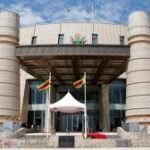By Beverly Bizeki
The Ministry of Primary and Secondary Education has issued a formal notice to unregistered educational institutions operating in Bikita district.
The notice warns offenders that they will not be allowed to open their doors from January 2025.
In a notice to offenders, the Bikita District Education Office stated that they are ready to enforce the law on unregistered schools. The district currently has 12 unregistered schools out of a total of 18 private and independent institutions.
“This letter serves to inform you that all unregistered independent and private institutions are supposed to be registered as according to the Zimbabwe Education Act, section 42(a), (b), (c) (3) 1. Failure to do so will result in the closure of the institution from 1 January 2025. Law enforcement agencies, including the Ministry of Primary and Secondary Education, will be prepared to enforce the Education Act,” reads the letter.
Bikita District Schools Inspector (DSI) James Mahofa told TellZim News that the notice was a warning shot after several attempts by the education office to encourage schools to follow proper procedures.
“These unregistered institutions in Bikita are very relaxed. We have asked them twice this year to come and register their institutions, but they have not taken any action. This is now a warning shot as we are prepared to ensure that they will not operate come January 2025 when schools open,” said Mahofa.
Mahofa stated that the move aims to safeguard learners’ education and protect parents from potential abuse by some unregistered institutions.
“We have discovered that there are many such institutions in Bikita. We have received reports of parents complaining about being abused, but when we try to trace these institutions, we find them closed.
“We want to prevent this, as some of these institutions do not even meet the required standards for a formal school. They lack basic amenities like ablution facilities, and we are uncertain about the curriculum they are using.
“It is crucial to have these schools registered so that proper inspections can be conducted by all relevant stakeholders,” said Mahofa.
Bikita Residents and Ratepayers Association (BIRRA) spokesperson Lucky Mukomondera however cautioned against the drastic action, arguing that there was no formal warning against the illegal operators.
He pointed out that the alleged illegal operators were paying levies to the council and the Better Schools Programme Zimbabwe (BSPZ). He therefore suggested the need for dialogue to ensure that the measures do not negatively impact learners.
“There was no formal warning, as these colleges had already budgeted for BSPZ subscriptions and council levies. A dialogue between the colleges and the ministry is necessary to protect the interests of the learners. This sudden ban will affect the already registered learners in these institutions.
“Why take such a harsh approach to social and economic drivers? Amicable solutions should be sought. Radical policy enforcement in education can undermine its purpose of justice. Authorities should support community-driven education initiatives without punishing already registered learners. These schools have contributed to both economic and social development in Bikita, providing innovative research, employment opportunities, and community development. We urge the Ministry to provide ample time for the easy registration of private colleges in Bikita,” said Mukomondera.
He emphasized the importance of adhering to the rule of law but also highlighted the need to address the shortage of schools in Bikita, which has led to the emergence of private colleges. In some cases, learners have to travel up to 10 kilometers to reach the nearest school.
“The rule of law must be upheld in the education system. However, Bikita District lacks sufficient primary and secondary schools, forcing some learners to travel long distances. The rise of private schools has facilitated easier access to education for many pupils in Bikita, aligning with global and national commitments.
“The sudden ban on unregistered private schools will strain the capacity of existing educational facilities, exacerbating the challenges posed by education inflation,” Mukomondera said.







